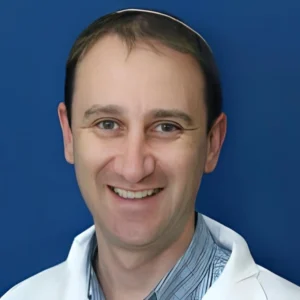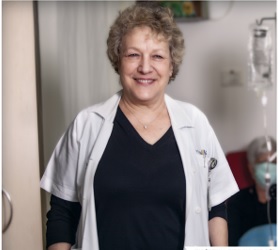Healthcare with Confidence
Personalized treatment for lung cancer means that therapy is not the same for everyone. Instead, doctors select the best approach for each patient, based on the type of lung cancer cells, the genetic mutations driving tumor growth, and the patient’s overall health and preferences.
This approach has transformed lung cancer care in Israel, where advanced molecular testing and access to the latest targeted and immunotherapy drugs allow oncologists to design highly effective, individualized treatment plans.
Types of Lung Cancer
- Lung cancer can develop from different types of lung cells. The two main categories are:
- Small cell lung cancer (SCLC) – around 10–15% of cases, aggressive and fast-growing.
- Non-small cell lung cancer (NSCLC) – the most common type, which includes adenocarcinoma and squamous cell carcinoma.
Even within NSCLC, cancer cells can carry unique molecular abnormalities, which serve as targets for personalized therapies.
Lung Cancer Doctors – Consultation Online
Why Molecular Testing Matters
A key first step in personalized lung cancer treatment is a lung biopsy to analyze tumor tissue in the lab. Doctors look for biomarkers – genetic mutations or protein changes that drive cancer growth.
Some of the most important biomarkers include:
- EGFR mutations
- ALK rearrangements
- ROS1, BRAF, RET, MET, and NTRK alterations
- PD-L1 expression (used to guide immunotherapy)
If one of these targets is found, patients can benefit from drugs designed to block that specific pathway.
Targeted Therapies in Israel
Targeted therapies have become a cornerstone of personalized lung cancer care. They are usually taken orally and are more tolerable than standard chemotherapy.
- EGFR inhibitors (Osimertinib/Tagrisso, Afatinib, Erlotinib) – block abnormal signals from EGFR mutations.
- ALK inhibitors (Alectinib, Brigatinib, Lorlatinib) – highly effective for ALK-positive NSCLC, including brain metastases.
- ROS1, RET, BRAF, MET, NTRK inhibitors – designed for patients with rare but actionable mutations.
- Anti-angiogenic therapies (Bevacizumab, Ramucirumab, Nintedanib) – block the formation of new blood vessels that feed the tumor.
Thanks to molecular profiling, Israeli oncologists can match patients with the most effective medication from the start.
Immunotherapy: Boosting the Body’s Defenses
In recent years, immunotherapy has revolutionized lung cancer care. Drugs called checkpoint inhibitors help the immune system recognize and attack cancer cells.
- Nivolumab (Opdivo)
- Pembrolizumab (Keytruda)
- Atezolizumab (Tecentriq)
Testing for PD-L1 expression helps determine which patients are most likely to benefit. Immunotherapy is often combined with chemotherapy or targeted therapy for stronger results.
Advanced Diagnostics in Israel
Personalized care also relies on precise diagnostic tools:
- PET-CT scans – detect tumor spread and hidden metastases.
- MRI – detailed imaging of the brain and chest.
- Liquid biopsy – a blood test that identifies circulating tumor DNA, allowing doctors to monitor mutations and adjust treatment without invasive procedures.
When Surgery or Radiation is an Option
For patients with small or localized tumors, surgery (lobectomy, segmentectomy) may be possible, sometimes followed by radiation therapy. For advanced stages, radiation can still help control symptoms and improve quality of life.
- Personalized Care Beyond Genetics
- Not all patients have targetable mutations. In these cases, personalization still matters:
- Adjusting chemotherapy combinations based on age, health, and tolerance.
- Choosing less toxic regimens for patients with heart or lung conditions.
- Combining systemic therapies with supportive care to preserve quality of life.
Israeli oncologists take into account the whole patient, not just the cancer.
The Future of Personalized Treatment
Lung cancer treatment in Israel continues to evolve:
- Next-generation sequencing (NGS) allows testing for dozens of mutations in one procedure.
- Combination therapies (immunotherapy + targeted drugs) are being studied in clinical trials.
- Adaptive treatment plans adjust quickly as new resistance mutations appear.
Why Choose Israel for Lung Cancer Care?
- Access to FDA- and EMA-approved medications and cutting-edge clinical trials.
- World-renowned oncologists, leaders of lung cancer units in major Israeli hospitals.
- Personalized treatment programs tailored to each patient’s molecular profile.
- Options for both in-person and online consultations.
FAQ: Personalized Lung Cancer Treatment
- What is personalized lung cancer treatment?
It’s treatment tailored to your tumor’s genetic makeup and your personal health profile, ensuring the best chance of success. - How do doctors know which drug will work for me?
Through biopsy and molecular testing of your tumor or blood (liquid biopsy). - Is personalized treatment available for all lung cancer patients?
Yes, though the exact approach differs. If no targetable mutations are found, treatment is still adjusted individually with immunotherapy, chemotherapy, or combined approaches. - Can I consult a doctor online?
Yes, our Israeli oncologists offer remote consultations for patients worldwide.






